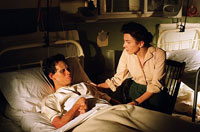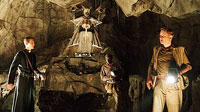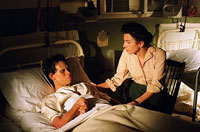 |
Have you ever looked at a film’s credits and wondered what the difference was between the “story” written by these guys over here and the “screenplay” written by those guys over there? Often, the “story” in question used to be a proper screenplay in its own right, until someone else was hired to give it a bit of a polish, and by the time the finished film came out, it became impossible to say for sure which bits were the work of which people.
You can see something of this process whenever an old movie is remade; some of the more confounding plot twists in, say, last year’s versions of The Stepford Wives and The Manchurian Candidate begin to make sense when you watch the original versions of those films and realize why and how the stories went in those directions. And when remakes go off in their own direction, it often says something revealing about the people that made them. But remakes are generally made many years after the originals—or, in the case of foreign-film adaptations like The Magnificent Seven, after a story has been transposed into a different culture—so the new films still tend to have an identity of their own.

So apart from the film’s actual content—more on that in a moment—the most remarkable thing about Dominion: Prequel to The Exorcist is that, in tandem with last year’s Exorcist: The Beginning, it provides a unique opportunity see how tweaking a screenplay can produce a very different film, even when many of the same elements are in place.
Dominion, a prequel to the classic 1973 horror film The Exorcist, was written by Caleb Carr and William Wisher (the latter of whom worked on the first two Terminator films), and directed by Calvin College graduate Paul Schrader, best known as the scriptwriter for Taxi Driver, Raging Bull and The Last Temptation of Christ. For Dominion, Schrader stepped in after the late John Frankenheimer fell ill during pre-production. Morgan Creek, the company behind the film, found Schrader’s version too cerebral, even though it was based on the script that they had approved; so they put it on the shelf, and hired Renny Harlin to shoot a brand new version, using the same cinematographer (Apocalypse Now‘s Vittorio Storaro), several of the same actors, many of the same locations and even a few of the same shots. Harlin’s film became Exorcist: The Beginning, and when it was released last summer, Carr and Wisher got a mere “story” credit, while the “screenplay” was now credited to Alexi Hawley.

Thus, anyone who has already seen the Harlin film will get a strange sense of déjàvu while watching the Schrader film, now out in limited release. Stellan Skarsgård is back as Father Lankester Merrin, the doubting priest who will go on to become the epitome of faith played by Max von Sydow in the 1973 film; and once again, he is haunted by the Nazi atrocities he witnessed when he was a parish priest in Holland—atrocities that have caused him to question the existence or at least the presence of God. Julian Wadham and Ralph Brown are also back as British officers who may be on the verge of committing similar atrocities in colonial Kenya, where Father Merrin is now involved in an archaeological dig.
But the contours of the story are quite different. Schrader is not at all interested in the gore and sadism that characterized Harlin’s film, though he does depict the victims of a few demonic attacks after the fact: one is crucified upside down, like St. Peter; another beheaded, like John the Baptist; and yet another is tied to a tree with arrows in his body, like St. Sebastian. A red herring in Harlin’s film, concerning a young African male who appears to be the victim of possession, turns out to be absolutely central to Schrader’s film; here, he is a cripple named Cheche (played by singer Billy Crawford), who actually seems to get healthier after the demon unleashed by Merrin’s excavations comes into him.

Cheche’s improved condition temporarily tricks the local missionary priest, Father Francis (Gabriel Mann), into thinking that he is an “innocent creature” and “the one proof of God in this town”—but the ironic thing is, even though Father Francis is wrong to believe that Cheche’s healing is of divine origin, the conclusion he draws from this healing may be right. Cheche’s possession proves the existence of a spiritual realm and a cosmic struggle for human souls, and this, in its own way, helps Father Merrin to regain his faith.
So far, so good—and those looking for a film of some spiritual significance will surely find Schrader’s prequel better and more interesting than Harlin’s, which went for shocking sensationalism. But as a prequel to William Friedkin’s The Exorcist, it still isn’t especially satisfying. The thing about Friedkin’s film is that it works on both cerebral and visceral levels simultaneously; we feel the film’s graphic depiction of evil in our guts even as we are invited to consider what this means in a modern world that has rejected the supernatural and reduced the soul to a set of physical and mental mechanics. But the prequels divide these elements—Schrader working almost exclusively on the cerebral level and Harlin working almost exclusively on the visceral level—and both films suffer as a result.

Schrader’s film is certainly interesting as a psychological story about faith lost and regained, and it might have made a good stand-alone film, but it is too restrained to merit the word “Exorcist” in its title. Even if we approach it purely as a character piece, we can never escape the fact that one of the film’s main characters is a demon whose outrageous behavior, so indelibly impressed on our collective memory thanks to the 1973 film, is only barely hinted at here. As a general rule, I will gladly take the director’s side against the studio’s any day, especially when the director is a talented individual who was simply working with a script that the studio had already approved; but I also have to say I can understand why the studio tried to punch things up a little. Full marks to Schrader for tackling a difficult subject, and for fighting to get his film shown. But after 32 years, two sequels, and two prequels, The Exorcist remains an impossible act to follow.
Talk About It
Discussion starters- Why is this film called “Dominion”? Who has dominion in this film? Does the film establish the power of God as clearly as it establishes the power of Satan?
- In his book Turn Back the Night, Stephen Lawhead once said that the message of the original Exorcist was that evil is powerful, but good is lucky. Do you think he was right? How do you think this film deals with those sorts of issues? Who is more powerful here, good or evil? Does luck play a role?
- The doctor, a Holocaust survivor, says people did not want to believe that such evil was possible. Why did they not want to believe this? Does faith in God become stronger or weaker because of our belief that evil exists? The doctor also says, “Sometimes I think the best view of God is from hell.” What do you think she means by this?
- What does Scripture say about how we should be equipped for spiritual battles—particularly the passage about the armor of God in Ephesians 6:10-18a. What “armor” was used well by the characters in this film? What armor wasn’t used? How might they have better confronted these demonic powers?
The Family Corner
For parents to considerDominion: Prequel to the Exorcist is rated R for strong violence and disturbing images. A man is possessed by a demon and attacks several people, leaving their wounded and desecrated bodies behind, though most of the violence itself takes place offscreen. Innocent civilians are shot by German and British occupying forces, and a newborn baby is covered in maggots.
Photos © Copyright Warner Brothers
What Other Critics Are Saying
compiled by Jeffrey Overstreetfrom Film Forum, 05/26/05Exorcist: The Beginning, Renny Harlin’s prequel to William Friedkin’s classic horror film The Exorcist, arrived to poor reviews last August. Critics accused Harlin of crafting a cheap horror flick based on shock value, a wasted opportunity to make something meaningful and memorable.
But Harlin’s version wasn’t the original plan. Paul Schrader was the first director hired for the project, but the studio decided Schrader’s version didn’t have enough blood, guts, and jump scenes to be a hit. So they fired Schrader and hired Harlin—then filmed the entire movie over again with the same cast but a new script. When that film reached theatres, the reviews made it clear: critics wanted to see Schrader’s version.
Now they have. And the results aren’t much better. Dominion follows Father Lancaster Merrin (Stellan Skarsgård) in his early years during an East African investigation where he encounters the demon Pazuzu and wrestles to regain his faith.
Peter T. Chattaway (Christianity Today Movies) says the film “provides a unique opportunity see how tweaking a screenplay can produce a very different film, even when many of the same elements are in place … But the contours of the story are quite different. Schrader is not at all interested in the gore and sadism that characterized Harlin’s film … [T]hose looking for a film of some spiritual significance will surely find Schrader’s prequel better and more interesting than Harlin’s, which went for shocking sensationalism. But as a prequel … it still isn’t especially satisfying.”
Mainstream critics aren’t as hard on this film as they were on Harlin’s version, but they still find it sorely lacking.
Copyright © 2005 Christianity Today. Click for reprint information.












